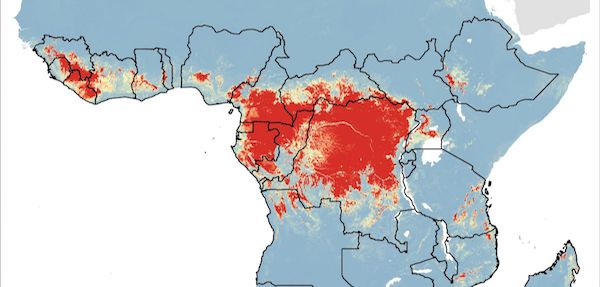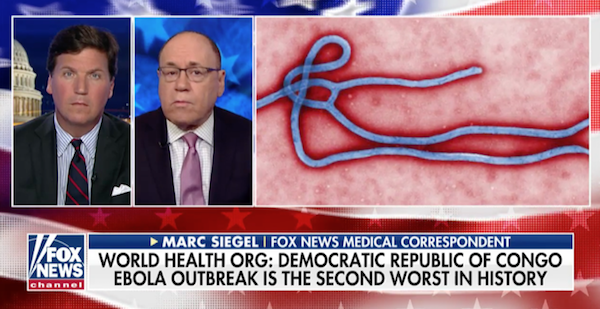An unfortunate side-effect of unrestricted borders is the entrance of Third World diseases that can then spread throughout the unprotected American public.
One such is Ebola, a mainly African disease that appeared in the US a few years ago when Ebola Tom traveled here from Liberia to get free First World medical care.
Below, a map of Ebola cases in Africa from 2014.

Now Ebola is back, and Africans are coming here, along with everyone else on earth who has heard about America’s worsened border laxity. I reported the other day about an apparently healthy Cameroonian man who had gotten as far as southern Mexico on his way here. There’s 1.3 billion more on the continent he came from, so don’t think only Hondurans are coming.
Tucker Carlson discussed the topic last week with Fox’s explainer doctor, Marc Siegel, who focused on the medical implications.

Tucker asked whether it is now even politically “possible to block people coming from any other country in the world” in the face of danger to the American people from a killer epidemic. It sounds like not so much.
This is where the politically correct view of America as Welfare Office for the World has brought us: if any human on earth (currently 7.7 billion persons) has a health problem or wants a better job, then the United States has to admit them.
TUCKER CARLSON: In other developing news tonight, there are new fears that Ebola could be heading to this country. One of the worst outbreaks of that horrifying disease in history is underway tonight and spreading fast. A thousand people have already died of Ebola in the Congo. It’s one of the deadliest infectious diseases known to man, of course, fewer than one third of the people who display symptoms survive.
Just five years ago, there was a major outbreak of Ebola that made it to our country. How concerned should we be if at all this time around? For those answers, we go to the man, we always go to NYU medical professor, Dr. Marc Siegel joins us tonight. Doctor, thanks very much for coming on.
DR. MARC SIEGEL: Hi, Tucker.
CARLSON: So this seems like a development really in in the history of Ebola, a thousand people. Should we be concerned?
SIEGEL: Yes, we should. And I’ll tell you why, Tucker, because it’s in an area of the Democratic Republic of Congo, where there is not an infrastructure, where there is militia swarming around over 119 Ebola clinics — they have been attacked by militia. So it’s a security problem in addition to a health problem.
It’s also erupting right now. We’ve had over 100 cases in the past week alone. You said a thousand deaths out of 1,500 cases over the last year. One hundred in the past week alone.
The World Health Organization is in the middle of this, but they don’t have money. There’s not enough vaccines. Here’s a good development since 2016: we now have a highly effective vaccine. It’s been given to a hundred thousand people; that may sound like a lot. It needs to be given to millions. We don’t have the vaccines, and people are dying without even knowing they have Ebola.
Forty percent of the deaths, Ebola is identified after the person dies. It is erupting. It’s spreading. It’s getting out of control.
CARLSON: Interesting. But Ebola, at least, as it has been explained in the Western media, it seems like it would be kind of hard to miss. I mean, you hemorrhage from various orifices. I mean, it’s horrible. And people don’t know they have it?
SIEGEL: They don’t know they have it because there’s no one around there identifying it. There’s no healthcare workers in the region. World Health Organization — people have been killed. It’s not a situation — granted, someone that knows infectious diseases or even medicine is going to be able to identify it.
Now again, it’s going to spread to neighboring countries, I believe. Here’s one positive thing about it. It’s very hard to spread. You can only spread it if you come in contact with secretions, with blood. So it’s not spread casually.
So even if a traveler were to bring it here, which happened in 2014, with Craig Spencer and others, it will only spread if proper precautions are taken. If another case, God forbid shows up in the United States, hopefully they’ll isolate that case, it won’t spread here.
But there, it’s an enormous problem. People themselves don’t know what it is. They know they have some serious, horrible disease. They don’t know it’s Ebola.
CARLSON: It’s unbelievable. Ebola, of course, is far from the only deadly communicable disease floating around the globe. Do you think politically it would be possible to block people coming from any other country in the world? Could we actually do anything in the face of an epidemic at this point?
SIEGEL: What we usually do in a case like this is we bring more and more of our workers in rather than blocking travelers. But if it gets to the point where I said a hundred cases in the past week, we were considering that back in 2014, if it gets to the point where we start having thousands and thousands of cases and nothing is being done internally.
Now, the Democratic Republic of Congo is trying to help. Their Health Ministry is doing a lot. But again the militias and the security problem there, UN Forces are there, but nothing with what we need. This is becoming not just a health issue, but also an issue of having to bring in armies and a mess — a total, total mess and it’s not diminishing, it’s growing and it’s going to spread to neighboring countries in Africa.
CARLSON: I’m not surprised at all. Doctor, thanks very much for your perspective. Great to see you.


